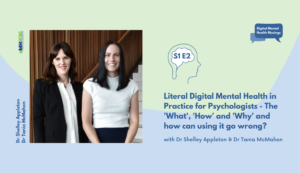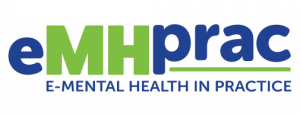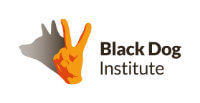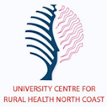Sign up below to receive monthly eMHPrac newsletters and updates about the latest digital mental health news, events, and resources.

Welcome to the April 2021 edition of the eMHPrac newsletter. The last few months have put workplace sexual assault and harassment under the spotlight again, with Brittany Higgins’ rape allegation in February sparking a wave of other accusations and revelations in Parliament. While the media focus has revived the conversation around harassment of women and pushed for change, it has also heavily impacted sexual assault survivors across Australia, with crisis services such as Lifeline reporting a significant increase in callers affected by the stories and disclosures. In this edition, we profile some digital resources to help those affected by sexual assault or harassment (or those supporting them).
In this edition
- Digital resources for sexual assault survivors
- Short on PD? Listen to Ep.2 of the eMHPrac Podcast – the ‘What’, ‘Why’ and ‘How’ of dMH for Psychologists, available now!
- Wellbeing resources for Indigenous clients – sign up to WellMob
- Trial: Online mood program for people with Intellectual Disability
- See the eMHPrac team at these upcoming conferences
- Read the latest dMH research articles
- This month’s featured service: 1800RESPECT
dMH Resources for Sexual Assault Survivors

Australia has several digital mental health services available to help survivors of sexual assault and those supporting them:
1800RESPECT
Confidential information, counselling and support for people impacted by Sexual assault, domestic or family violence and abuse.
Rape and Domestic Violence Services Australia
Telephone and online counselling for people of all genders whose lives have been impacted by sexual, domestic or family violence, and specialist help for their supporters and those experiencing vicarious trauma. Includes specific phone lines for those affected by the Royal Commission, those affected by domestic violence, and those from the LGBTIQ+ community.
No to Violence
A Men’s Referral Service providing telephone counselling, information and referrals for men taking responsibility for their violent behaviour (or seeking information on behalf of male partners/friends/family members).
Blue Knot
Telephone support, education and resources for Australian adults who have experiences childhood trauma and abuse and their friends, families and loved ones.
No time to read? Listen to the eMHPrac Podcast!
Ep.2 – dMH in Practice for Psychologists: That ‘What’, ‘How’ and ‘Why’

In Episode 2, Dr Ruth Crowther interviews Clinical Psychologists Dr Shelley Appleton and Dr Tania McMahon. Together, they discuss how to use digital interventions when working with clients – the ‘What’, ‘How’ and ‘Why’. With numerous practical tips throughout, they also troubleshoot common challenges.
Digital Mental Health Musings is an initiative of the federally funded eMHPrac project, helping health professionals to navigate the growing world of digital mental health resources.
You can access the Digital Mental Health Musings Podcast via the eMHPrac website, SoundCloud, Apple Podcasts, Spotify, Google Podcasts, Deezer and Amazon Music for new episodes on the first Sunday of every month.
Need online wellbeing resources for your Indigenous clients
eMHprac’s new WellMob website houses 200+ Indigenous-specific social and emotional wellbeing resources for you to use with your Aboriginal and Torres Strait Islander clients.
The quarterly WellMob e-newsletter will showcase key online resources and demonstrate how you can use them in your workplace and community. The resources are also great for your own self-care practices!
Click below to sign up!
Help test an online mood program for people with Intellectual Disability

Mental illness is more common among people with an ID than the general population. It can also be difficult for health professionals to identify mental illness in this group and even harder for affected people to access the help that they need.
Black Dog Institute want to know if we can improve mental wellbeing in people with ID by adapting cognitive behavioural therapy to meet their unique learning needs and delivering the therapy online.
Participants have the choice to complete the study independently or nominate a study helper to assist the research participant to complete the questionnaires.
Visit the study website to find out more.

Catch us at these upcoming conferences:

International Mental Health Conference
26-28 July, RACV Royal Pines Resort, Gold Coast
‘Unite with a Community Changing the Face of Mental Health’
The International Mental Health Conference is designed for professionals, workers and volunteers to learn best practice, grow meaningful connections and implement real solutions to mental health care.
Special Offer!
As a proud member of the IMHC Committee, the eMHPrac Team are pleased to offer a discount of 10% on conference registrations.
For every registration secured with this code, $100 will be donated to the IMHC ‘Lived Experience Fund’, which will offer scholarships for those with a lived experience background who wish to attend the conference.
Visit the conference website and use the code IMHCOMMITTEE when registering.
On our reading radar
Moderated Online Social Therapy for Young People With Active Suicidal Ideation: Qualitative Study
Bailey E, Robinson J, Alvarez-Jimenez M, Nedeljkovic M, Valentine L, Bendall S, D’Alfonso S, Gilbertson T, McKechnie B, Rice S. Moderated Online Social Therapy for Young People With Active Suicidal Ideation: Qualitative Study. J Med Internet Res 2021;23(4):e24260. https://www.jmir.org/2021/4/e24260. DOI: 10.2196/24260
“Web-based interventions are a promising approach to support youth at risk of suicide, and those incorporating peer-to-peer social networking may have the added potential to target interpersonal states of perceived burdensomeness and thwarted belongingness.
We conducted a pilot evaluation to test the feasibility, safety, and acceptability of a Moderated Online Social Therapy intervention, called Affinity, with a sample of young people with active suicidal ideation.
A total of 4 overarching themes were identified: a safe and supportive environment, the importance of mutual experiences, difficulty engaging and connecting, and the pros and cons of banning discussions about suicide. Interestingly, although Affinity was perceived to be safe and free of judgment, concerns about negative evaluation and triggering others were significant barriers to posting on the social network. Participants generally supported the banning of conversations about suicide, although for some this was perceived to reinforce stigma or was associated with frustration and distress.
The results not only support the safety and potential therapeutic benefit of the social networking aspect of Affinity but also highlight several implementation challenges. There is a need to carefully balance the need for stringent safety and design features while ensuring that the potential for therapeutic benefit is maximized.”
Borghouts J, Eikey E, Mark G, De Leon C, Schueller S, Schneider M, Stadnick N, Zheng K, Mukamel D, Sorkin D. Barriers to and Facilitators of User Engagement With Digital Mental Health Interventions: Systematic Review. J Med Internet Res 2021;23(3):e24387. https://www.jmir.org/2021/3/e24387. DOI: 10.2196/24387
“Digital mental health interventions (DMHIs), which deliver mental health support via technologies such as mobile apps, can increase access to mental health support, and many studies have demonstrated their effectiveness in improving symptoms. However, user engagement varies, with regard to a user’s uptake and sustained interactions with these interventions.
This systematic review [aimed] to identify common barriers and facilitators that influence user engagement with DMHIs.
Common barriers included severe mental health issues that hampered engagement, technical issues, and a lack of personalization. Common facilitators were social connectedness facilitated by the intervention, increased insight into health, and a feeling of being in control of one’s own health.”
This edition’s featured service…
1800RESPECT
24hr telephone and online counselling service to assist people experiencing sexual, domestic and family violence.
About 1800RESPECT
1800RESPECT is a national telephone and online counselling service to assist people in Australia who are experiencing the effects of sexual assault or domestic and family violence.
1800RESPECT provides help with safety planning and finding support for those directly affected by sexual assault or domestic and family violence. They also provide information about helping a friend or relative affected by violence and abuse, and guidance on professional responsibilities and how to best assist people experiencing sexual assault and domestic and family violence.
Who is 1800RESPECT for?
1800RESPECT targets all who are experiencing sexual assault or domestic and family violence, as well as those seeking to support someone else. Professionals are also encouraged to use 1800RESPECT for support with secondary referrals or vicarious trauma.
Is there a cost to use 1800RESPECT?
No, calls from a landline and mobile are free. There is no cost to use the online counselling.
How to access 1800RESPECT
Anyone across Australia can contact 1800RESPECT via:
- 24 hour telephone counselling line (1800 737 732)
- 24 hour online counselling available at https://www.1800respect.org.au/







